“In our struggle, we need to be united. Even though we are far from each other, we’re still in Sarawak... I hope we, the indigenous peoples, can stand united in dealing with our problems. Even if we meet in prison, we will have to fight this together,” said Gara Jalong, chief of a Kenyah village Long Lawen, near the Bakun dam.
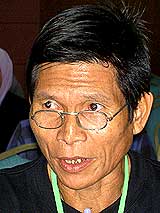 The dam sits upstream above the Rejang River, that in turn flows down towards Sibu. Gara (
right
) was sharing his Bakun resettlement experience with Dayak communities from distant parts of Sarawak. These other native communities are also facing eviction from their ancestral Native Customary Rights (NCR) land, thanks to the planned construction of 12 enormous new dams.
The dam sits upstream above the Rejang River, that in turn flows down towards Sibu. Gara (
right
) was sharing his Bakun resettlement experience with Dayak communities from distant parts of Sarawak. These other native communities are also facing eviction from their ancestral Native Customary Rights (NCR) land, thanks to the planned construction of 12 enormous new dams.
The dam mega-projects have been heavily criticised for providing lucrative construction contracts for wealthy companies closely linked to Sarawak’s aging, but near-omnipotent chief minister, Abdul Taib Mahmud.
Bakun captured headlines last week because Radio Television Malaysia (RTM) binned eight remaining episodes of a sobering television documentary on the fate of 10,000 resettled Sarawak natives, filmed by Chou Z Lam. The documentary portrayed the bitter harvest that poverty-stricken natives have reaped since they were compelled to make way for the giant hydro-electric dam project in 1998.
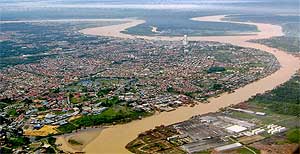 The RTM decision to scrap the screening has ignited debate over censorship in our media in the run-up to the Sibu by-election. The authorities deemed the Bakun documentary too sensitive for public viewing before the May 16 polls.
The RTM decision to scrap the screening has ignited debate over censorship in our media in the run-up to the Sibu by-election. The authorities deemed the Bakun documentary too sensitive for public viewing before the May 16 polls.
The shadow of Bakun hangs over the upcoming Sibu contest, though the incumbent BN remains a clear favourite to win. The deprivation of 10,000 natives, forced by the government to give up their land in order to generate electricity surplus to the state’s requirements, continues to fuel the anger of Sarawak’s natives over the loss of their NCR land to the BN-industrial complex.
Heart-wrenching exodus
“We came to settle here because we were forced to, not by our own will,” said Lejau Ului, an inhabitant of the Sungai Asap resettlement scheme. He was originally from the beautiful, but now submerged, Kenyah longhouse of Long Geng.
A total of 1,640 Dayak families were removed from established villages, from roots stretching back many generations, so that the Bakun dam could be built. The dam’s reservoir area flooded 695 square kilometres of forests, more than double the size of Penang island.
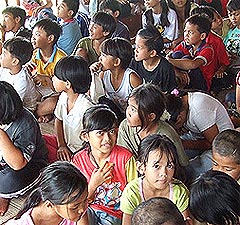 “At the beginning, we were told the electricity is free, water is free. Our house is free for the first five years, then after that we’d have to pay for it. That was the government’s promises,” Lejau reflected ruefully.
“At the beginning, we were told the electricity is free, water is free. Our house is free for the first five years, then after that we’d have to pay for it. That was the government’s promises,” Lejau reflected ruefully.
“Now, they are telling us to sign the sale-and-purchase agreement for our houses. No one here is willing to sign that agreement.”
The authorities harried the resettled people into signing sales-and-purchase agreements for their houses in Sungai Asap. According to community news site Rengah , the houses were small, made of cheap wood, shoddily constructed and – priced at RM52,000 each – “would be considered daylight robbery” by peninsular Malaysians.
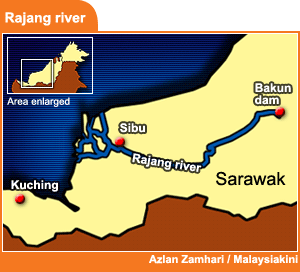 The cash for the ramshackle new houses was to have come from compensation for the natives’ flooded crops and lands. However, a dozen years on, many families have only received a pittance for the land they vacated.
The cash for the ramshackle new houses was to have come from compensation for the natives’ flooded crops and lands. However, a dozen years on, many families have only received a pittance for the land they vacated.
“After we made our compensation claims, many of us thought that we were going to receive around RM100,000. Then, another group (from the Land and Survey Department) came to survey our lands. It is this group that cancelled our initial claims,” Gara related.
“They came but didn’t do a proper job. They came to take photos and came upriver by boats, by our longboats. They only observed the area around them from the boat. How could they see if there’s cocoa there, fruits up there, or pepper over there? How could they see all these from there?
“They only looked up from the boat. They didn’t even come up to look at the land and farms that people owned. They cancelled everything (all our claims) from the boat. All our claims at Long Geng were cancelled. Whatever was left after being cancelled, that’s all we got!”
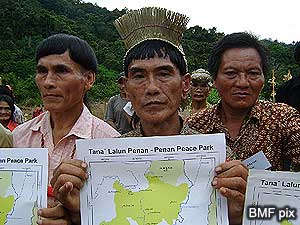 Gara pointed out that the compensation for each hectare of land was no more than RM1,000. “So you can see how easy it was for them to compensate us ... in the end, not even a single family has received RM100,000.”
Gara pointed out that the compensation for each hectare of land was no more than RM1,000. “So you can see how easy it was for them to compensate us ... in the end, not even a single family has received RM100,000.”
Struggling with a cash economy
Gara continued: “We didn’t really need money. We didn’t need to bring money to work, to the jungle. But now the way it is here (in the resettlement scheme), everyone who goes to their land or to their farms, they have to bring money. That is because we have to pay (for petrol) to use the motorcycle. And if you don’t have money here, you can’t buy food... But when we were in Long Geng, we didn’t have to buy food.”
After the modicum of compensation for land was dished out by government agencies, the villagers were exposed to previously unknown sums of cash. A crash course in financial management followed, with no guides, teachers nor safety nets, and unsurprisingly, virtually everyone failed.
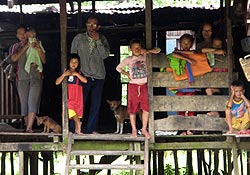 At first, four-wheel-drive Pajeros and jeeps appeared in the two narrow, parallel streets of Belaga, the nearest small hamlet to Bakun. But the vehicles soon ran out of petrol, broke down and were re-possessed. The tranquil, sleepy wooden shops of Belaga, looking out on a wall of green across the enormous Rejang river, were transformed almost overnight, beset by drunken brawls and loud music.
At first, four-wheel-drive Pajeros and jeeps appeared in the two narrow, parallel streets of Belaga, the nearest small hamlet to Bakun. But the vehicles soon ran out of petrol, broke down and were re-possessed. The tranquil, sleepy wooden shops of Belaga, looking out on a wall of green across the enormous Rejang river, were transformed almost overnight, beset by drunken brawls and loud music.
“When we first arrived here, when we just received our compensation, if you looked from here to there,” Lejau said, gazing down the longhouse corridor in Sungai Asap, “you could see cans of Heineken (beer) lining up along the walls where people would sit and drink. Now, you don’t see these anymore because there’s no more money. It’s all been used up.”
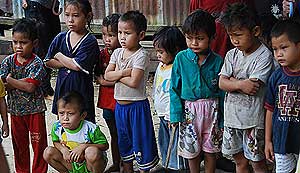 The cash ran out only too quickly as the natives could not deal with being plunged into an unfamiliar, heavily monetised economy.
The cash ran out only too quickly as the natives could not deal with being plunged into an unfamiliar, heavily monetised economy.
When the communities were relocated, the people asked initially for 10 acres, or four hectares, of farmland each. They were eventually given three acres, or just over a hectare, per family.
“‘Don’t worry about your three-acre land. If your land is already fully used, you can always ask for more later,’ the government told us. ‘The government will not forget all of you. The government will manage all your problems,’ we were told.
“So that’s why we came. It’s only after we arrived here that we realised the problems. What the government said wasn’t true after all,” Lejau recalled.
‘We’re not squatters’
Rudimentary school and clinic services were provided, but the clinic was plagued by slipshod construction and collapsing floors. The lack of economic activity, employment opportunities and food sources caused tremendous distress for the newly-resettled people.
“Another problem we face here is the cemetery. Each community must have its own cemetery. But here in the resettlement scheme, the government allocates only two areas for the cemetery... I know communities fight among one another because of this,” Gara said.
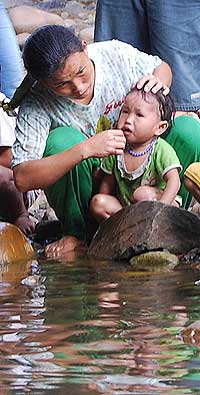 “What really worries me now is,” Lejau said, “our lands here which are not yet approved to be legally ours. We have not been given the rights to these lands because the government still controls this area,” he went on.
“What really worries me now is,” Lejau said, “our lands here which are not yet approved to be legally ours. We have not been given the rights to these lands because the government still controls this area,” he went on.
“When we moved here, we didn’t move because of our own will. We moved because the government ordered us to move. When the government provided the land here, they should have also transferred our land rights from the old settlement to this place,” Gara said.
“According to the government’s order, the customary rights to our land have been extinguished. The agreement says once we have received the compensation for loss of properties and land, it means we have agreed to extinguish our rights to our lands in the old settlement,” he explained.
“The government regards us as squatters,” Gara frowned. “This is what all of us Sarawakians do not want to hear. We are all natives of Sarawak. We were born in the land of our ancestors.”
KERUAH USIT is a human rights activist - ‘anak Sarawak, bangsa Malaysia’. This weekly column is an effort to provide a voice for marginalised Malaysians. Keruah Usit can be contacted at [email protected].

